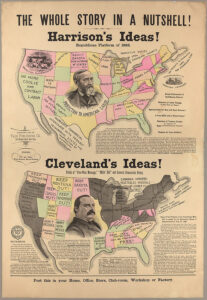The campaign leading up to the U. S. presidential election of 1888 was characterized by passionately debated political positions by both candidates and their respective civilian supporters. The incumbent candidate Grover Cleveland with his victory in 1884 had been the first Democrat to win the popular vote since the 1856 presidential elections just several years prior to the Civil War. Though the Democratic Party had evolved since the war, it still carried the taint of having been the party associated with slavery and the Southern states’ secession from the Union. Indeed, the core of the party’s constituency still resided in the heavily agrarian southern region of the country.
The Republican Party and its candidate Benjamin Harrison firmly represented the manufacturing industries that were primarily located in the Northern and Midwestern parts of the country. A major plank in the Republican platform called for the institution of high tariffs on imported factory-made goods as a protective measure for domestically manufactured materials. Grover Cleveland and the Democratic Party staunchly opposed these tariffs on foreign goods reasoning that it would ultimately result in higher consumer prices for working Americans especially farmers.
In Norwich two local merchants with businesses on Franklin Street found themselves at political loggerheads during this presidential campaign season. Hubbard Avery, a diehard supporter of Benjamin Harrison owned a grocery store on Franklin Street about 500 feet from the butcher shop owned and run by Isaac Rist a devoted Republican and enthusiast of Grover Cleveland. In the spirit of a good natured rivalry they placed a whimsical bet on the outcome of the presidential election that came to be known locally as “the great wheel-barrow wager”. The prescribed rules of the wager compelled the gentleman that had supported the losing presidential candidate to personally provide a wheel-barrow ride through the streets of Norwich to the man who backed the winner.
On November 6, 1888, despite losing in the popular vote total by 60,000 votes to Grover Cleveland, Benjamin Harrison prevailed in the electoral college vote 233 to 168 and became the 23rd president of the United States. One week later, the loser of the wager, Mr. Rist arrived at Mr. Avery’s storefront grocery on Franklin Street grocery pushing a decorated wheel-barrow. Mr. Avery emerged from his store and took his seat of honor. To the hearty cheers of the assembled crowd and with the musical accompaniment of the Tubbs Military Band, the wheel-barrow parade commenced at approximately 8 p.m. The shops and residences on Franklin and Boswell streets were festooned with Chinese lanterns and a profusion of fireworks illuminated the hundreds of persons who assembled along the parade route and created a carnival-like atmosphere. Upon reaching the Wauregan Hotel the parade halted for a formal acknowledgement to the winner of the wager and Mr. Avery was presented a bouquet of flowers. Though the parade lasted only thirty minutes, the Norwich Bulletin remarked in an article the next day “it was one of the most crowded half hours Norwich ever knew”. Rist and Avery shook hands and together with their mutual friends headed off for a late supper at Benjamin’s restaurant on Broadway.
Benjamin Harrison was sworn into office as president in late January of 1889. Within a few months, the Republicans in Congress pushed through the McKinley tariff bill which gave the president the right to negotiate tariffs with individual foreign countries. During the next few years these tariffs served as a catalyst for higher consumer prices for the average American citizen. The public backlash against these tariffs was so strong it delivered Grover Cleveland a reelection victory over Harrison in the November election of 1892, returning him to the White House in January of 1893.

